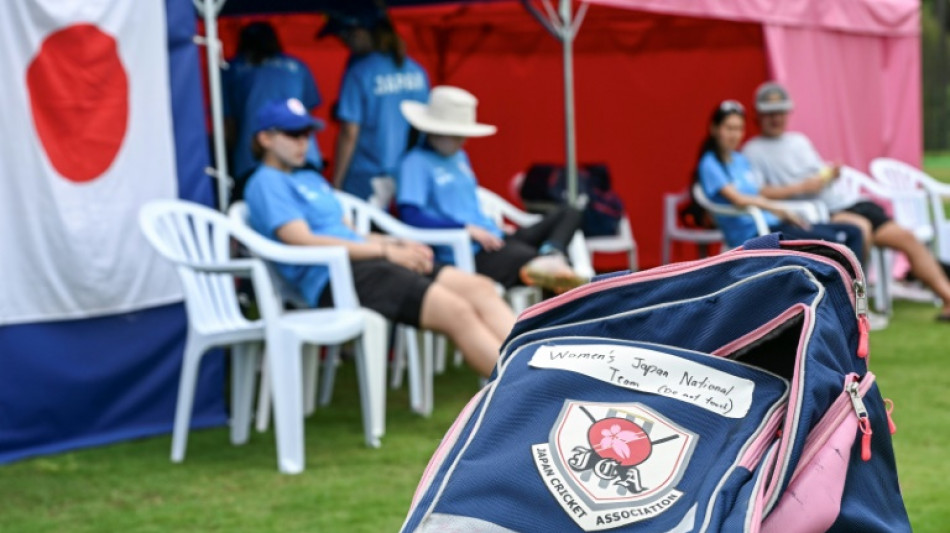
-
 Russia pounds Ukraine with 'hundreds' of drones and missiles: Kyiv
Russia pounds Ukraine with 'hundreds' of drones and missiles: Kyiv
-
Wallabies record-holder Slipper hints Perth could be final Test
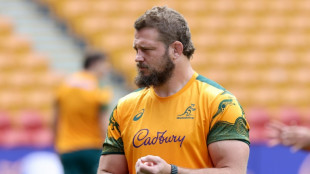
-
 Son brace fuels LAFC as Messi frustrated in Miami draw
Son brace fuels LAFC as Messi frustrated in Miami draw
-
US actress-singer Selena Gomez weds music producer Benny Blanco

-
 Pakistani parents rebuff HPV vaccine over infertility fears
Pakistani parents rebuff HPV vaccine over infertility fears
-
Women's cricket set for 'seismic' breakthrough at World Cup
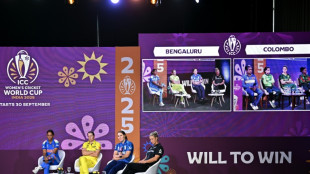
-
 New Zealand fly-half Barrett out of Australia rematch
New Zealand fly-half Barrett out of Australia rematch
-
Moldovans torn between pro-EU and pro-Russia vote in tense polls

-
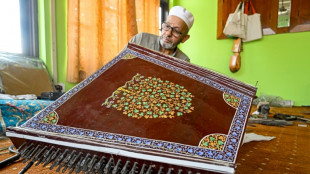 Strings of identity: Kashmir's fading music endures
Strings of identity: Kashmir's fading music endures
-
'Clog the toilet' trolls hit Indian visa holders rushing to US

-
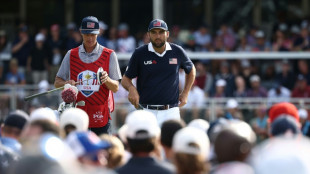 Bradley: USA Ryder Cup disaster part of why crowds angry
Bradley: USA Ryder Cup disaster part of why crowds angry
-
Europe used 'anti-fragile mentality' to cope with Cup hecklers

-
 Unbeaten McIlroy faces winless Scheffler in Ryder Cup singles
Unbeaten McIlroy faces winless Scheffler in Ryder Cup singles
-
Sweeping UN sanctions return to hit Iran after nuclear talks fail

-
 Messi, Miami frustrated in Toronto stalemate
Messi, Miami frustrated in Toronto stalemate
-
Argentina protesters march for victims of live-streamed femicide

-
 Europe shrugs off intense abuse to reach brink of Ryder Cup win
Europe shrugs off intense abuse to reach brink of Ryder Cup win
-
Injury-hit PSG reclaim Ligue 1 top spot ahead of Barcelona clash

-
 Understrength PSG reclaim Ligue 1 top spot ahead of Barcelona clash
Understrength PSG reclaim Ligue 1 top spot ahead of Barcelona clash
-
Argentina protesters seek justice for victims of live-streamed femicide

-
 Palhinha rescues point for Tottenham against winless Wolves
Palhinha rescues point for Tottenham against winless Wolves
-
Springbok Feinberg-Mngomezulu an 'incredible talent' - Erasmus
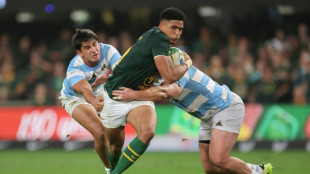
-
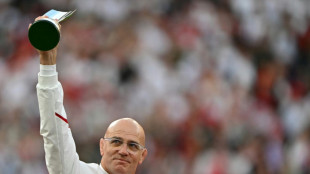 Mitchell backs England to sustain dominance after World Cup triumph
Mitchell backs England to sustain dominance after World Cup triumph
-
Zaporizhzhia nuclear plant off grid; Russia, Ukraine trade blame

-
 McIlroy fires back at hecklers in intense Ryder Cup atmosphere
McIlroy fires back at hecklers in intense Ryder Cup atmosphere
-
Two women die trying to cross Channel from France

-
 Huge Berlin protest urges end to Gaza war
Huge Berlin protest urges end to Gaza war
-
Liverpool 'deserved' defeat to Crystal Palace, says Slot

-
 Bottega Veneta shows off 'soft functionality' in Milan
Bottega Veneta shows off 'soft functionality' in Milan
-
Maresca blasts careless Chelsea after Brighton defeat

-
 Juve miss out on Serie A summmit with Atalanta draw
Juve miss out on Serie A summmit with Atalanta draw
-
Guardiola salutes dynamic Doku as Man City run riot
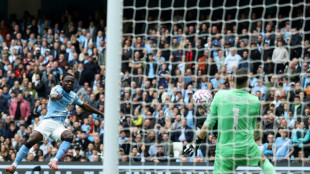
-
 Russia warns West as Ukraine secures Patriot defenses
Russia warns West as Ukraine secures Patriot defenses
-
Ten-man Monaco miss chance to retake top spot in Ligue 1

-
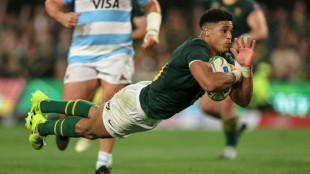 Feinberg-Mngomezulu scores 37 points as Springboks top table
Feinberg-Mngomezulu scores 37 points as Springboks top table
-
Trump authorizes 'full force' troop deployment in Portland

-
 Matthews at the double as England beat Canada to win Women's Rugby World Cup
Matthews at the double as England beat Canada to win Women's Rugby World Cup
-
Real Madrid 'hurting', deserved to lose derby: Alonso

-
 Handshake spat bad for cricket, says Pakistan captain ahead of India final
Handshake spat bad for cricket, says Pakistan captain ahead of India final
-
England beat Canada in Women's Rugby World Cup final

-
 Hezbollah says it refuses to be disarmed one year after leader's killing
Hezbollah says it refuses to be disarmed one year after leader's killing
-
Atletico thrash Liga leaders Real Madrid in gripping derby

-
 Liverpool's perfect start ended by Crystal Palace, Man Utd beaten at Brentford
Liverpool's perfect start ended by Crystal Palace, Man Utd beaten at Brentford
-
Unbeaten Rahm sparks Europe to historic five-point Ryder Cup lead

-
 Dortmund keep heat on Bayern with Mainz win
Dortmund keep heat on Bayern with Mainz win
-
Under-fire Amorim accepts criticism as Man Utd crash at Brentford

-
 Sweeping UN sanctions loom for Iran after nuclear talks fail
Sweeping UN sanctions loom for Iran after nuclear talks fail
-
Canadian Vallieres pulls off cycling world title surprise in Kigali hills

-
 Dakuwaqa outshines Bielle-Biarrey as Stade Francais beat Bordeaux-Begles
Dakuwaqa outshines Bielle-Biarrey as Stade Francais beat Bordeaux-Begles
-
West Ham hire Nuno to replace sacked Potter


From samurai threat to Asian Games as Japan cricket fights obscurity
Legend has it that death threats from disgruntled samurai warriors were behind Japan's first cricket match in 1863 and the sport has battled for recognition in the baseball-mad country ever since.
But Japan's cricket association, which operates out of a disused school near a wooded mountain, says the sport is slowly gaining popularity and hopes next year's home Asian Games and the 2028 Los Angeles Olympics can take it to a new level.
"My whole 11 years here have been about trying to provide people with opportunities to play," said Englishman Alan Curr, Japan Cricket Association's chief operations officer.
"That's a lot easier if they know the sport exists. Ultimately, you can't be what you can't see."
Curr says cricket is growing annually in Japan with more than 5,000 adults and children playing the game regularly and about three times as many having tried it in some form.
That is still a drop in the ocean compared to Japanese baseball, which is played by millions and produces global superstars such as the Los Angeles Dodgers' Shohei Ohtani.
The two sports arrived in Japan at roughly the same time, although cricket's origins were slightly less auspicious.
A samurai threat to kill all foreigners who refused to leave Japan prompted a group of European residents to seek protection from the British navy in Yokohama.
They had a game of cricket to pass the time, playing with loaded guns tucked into their belts to guard against possible attack.
A Scottish tea merchant founded the first cricket club in Japan five years later but it failed to catch on beyond expatriate circles.
Fast forward to the late 1980s and several universities began playing -- "students were looking for something unique", according to global governing body the ICC.
- Spreading the word -
The sport has maintained a niche presence, although rising numbers of South Asian residents in Japan have boosted the playing population.
Japan's national teams reflect the sport's Commonwealth roots, featuring several players with parents from cricket-playing countries.
The JCA, founded in 1984, has worked hard to introduce cricket to people with no previous experience, concentrating their efforts on selected hubs around the country.
Japan women's Twenty20 captain Mai Yanagida told AFP she "knew the name but didn't really know what kind of sport it was" until she took up cricket at Waseda University in Tokyo.
"I played softball and baseball before that, but in cricket you can hit the ball 360 degrees," she said at the Women's Sano City International Trophy this month.
"I think it's more a sport where you need to play together as a team."
The Sano City tournament was played at Japan's cricket headquarters about 100 km (60 miles) outside of Tokyo, on the playing field of a high school that closed its doors more than a decade ago.
After losing their opening game, Japan went on to lift the trophy, beating Hong Kong in the final of a tournament that also featured fellow cricketing minnows China, the Philippines and Mongolia.
The win came weeks after Japan's men qualified for next year's Under-19 World Cup in Zimbabwe and Namibia.
- From baseball to cricket -
Cricket will feature at next year's Asian Games in Japan before it returns to the Olympic programme for the first time since 1900 at the Los Angeles Games.
Japan's women won bronze at the 2010 Asian Games and the men made their debut at the 2023 edition, finishing with one win and one defeat.
The men's team featured former professional baseball player Shogo Kimura, who took up cricket in 2017 after a 14-year career with some of Japan's biggest teams.
Yanagida believes the Asian Games in Nagoya-Aichi and the Olympics can "have a really big impact" on cricket's profile in Japan.
"It will be in the news as an Olympic sport so the media can help the name cricket become more widely known," she said.
Qualifying for LA will be a tall order for Japan, whose men's T20 team are ranked 42nd in the world, with the women 43rd.
All the players are amateurs and Curr says organising games against teams from outside Asia can be difficult.
He concedes that there is "no silver bullet" to make cricket genuinely popular in Japan but that will not stop those who love the sport from trying.
"You're not an overnight success, there's always a lot of stuff that goes on behind it and we're in that phase now," said Curr.
"We're building a platform that we hope can then shock people at some point."
R.Braegger--VB


